|
John
Platt Interview with Alvin Lee - Rockspective 1993
|
JP:
Alvin, anybody who has listened to any of
your music for the last twenty five years or
so would know that your roots are firmly in
the blues, but how did a young boy growing
up in late 1950ís England get to hear the
blues?
AL:
My father used to collect blues, he was an
avid fan of chain/prison work songs,
chain-gang songs, that kind of thing and I
grew up with that, it was always playing
around the house. He was a fanatic, he used
to listen to Big Bill Broonzy and Lonnie
Johnson, more the delta blues and the
Mississippi blues rather than the city blues
and he had a very ethnic collection of stuff
which is as I say, it just must of, sort of
got into my brain at a very early age, and
one day I remember very vividly I was twelve
years old and he went to see Big Bill
Broonzy playing in Nottingham in a club
where I lived and he brought him back to the
house and they went and woke me up so I
could see this guy and I remember sitting on
the floor looking up at this giant man
stomping away playing the blues and I think
that was probably what started it all off,
like the next day I decided to become a
blues player.
JP: Were your first influences
the country blues players that your father
liked?
AL:
Yeah, they were I suppose, it was a mixed
thing, I had previously to that I had played
the clarinet for a year and I didnít like
it, it was one of those things where they
said we
want you to play an instrument what do you
want to play and I donít know why I said
the clarinet but I played the clarinet and
then through listening to Benny Goodman I
heard Charlie Christian and I decided I
liked what Charlie was doing much more than
what Benny Goodman was doing, so I
definately had a feeling for the guitar.
Itís difficult to say, all those years ago
but the guitar to me, I think itís the Big
Bill Broonzy thing that really clinched it,
I just went and swapped my clarinet for a
guitar in fact.
|
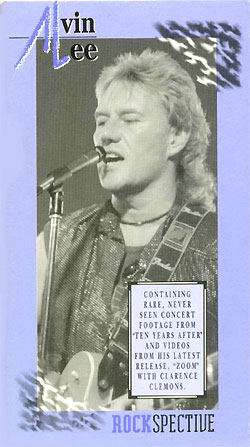
|
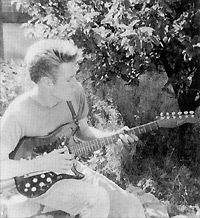 JP:
Perhaps you could give us an idea of the sort of
thing that Bill was playing that influenced you? JP:
Perhaps you could give us an idea of the sort of
thing that Bill was playing that influenced you?
AL:
Well Big Bill, he used to play his blues, he would
keep the rhythm going and play with his fingers to
give it a great effect (Alvin plays a song that
sounds just like
Donít Want You Woman on guitar which
shows the Big Bill Broonzy style and the big
influence he had on Alvin)
JP: Well presumably in time you got
to hear and appreciate the city blues players like
I assume like BB King, Buddy Guy ect.
AL:
Yeah, well the next step for me to be honest
was Chuck Berry when I heard Chuck Berry suddenly
I was probably fourteen or fifteen years old and
to me it sounded like the blues with more energy
and the first I heard of Chuck Berry I think Sweet
Little Rockín Roller probably the first track or
something like that, and it just got to me and I
just loved the energy cause Chuck would play that
kind ofÖJohnny B. Goode. The truth is I
was interested in the guitar in all its forms. I
listen to classical Andreīs Segovia, I listen to
flamingo stuff and Mel Travis the country guys it
was all good guitar players I mean I was keen to
dabble in all those things.
JP:
Well when you started playing in bands presumably
the R & B and the Blues scene started to take
over.
AL:
Yeah,Yeah well I used to, I mean the first bands I
played with it was pretty much kind of, most of
the gigs were pretty much top forty type you know
and you had to play what was in the charts and in
those days it was pretty grim it was like Frankie
Lane and Pat Boone and stuff like that. We used to
play clubs and maybe do three sets and the last
set weíd go on at one Oíclock in the morning
and thereís a half a dozen people there and
weíd play blues and like a couple of people
would come up and say I really liked that ya know,
and that was fun to me, that was more rewarding
than the whole audience all jumping up and down to
me playing some current pop song.
JP:
Presumably by the time you came down to London in
1966 you were pretty much established as a blues
player this was the impression we had of you at
the time.
AL:
Yeah Yeah, thatís right but I did still like
Rock and Roll and I used to play blues with more
energy, in fact there was a lot of purist, it was
quite funny these plot purist blues fanatics and
they would come and they all would wear leather
coats for some reason and all stand around almost
taking notes as you were playing and watching very
intently and they used to come back and say hey,
youíve played that Elmore James solo wrong and
that really used to annoy me because I said I play
what I feel Iím not copying somebody else and
theyíd say
I know but you played it wrong it doesnít go
like that and so I kicked against all that, so I
use to purposly kind of make it a bit more crazy
and add some energy and try to rock it up a bit,
which is the basis of English Blues to me I mean
itís American music and I learned it from
Americans and American blues artists added a bit
of energy and kind of took it back, recycled it
and took it back to America and they called it
British Blues which I always thought was very
strange.
JP:
Did you see yourself as part of the big blues
explosion of the late 1960ís I mean there
certainly was a movement but did you see your band
as being part of that?
AL:
Not really, I think when your on the inside of a
band thatís happening your kind of the last to
know, you know, to me it was gigís and the whole
thing was trying to fill the date sheet and try to
make enough money to eat really, we got more gigs
and it seemed good but I didnít feel that it was
part of any explosion at the time I donít know.
JP:
and what about America because you became
phenomenonally successful in America quite quickly
what do you think would account for that?
AL:
Well one of the reasons the second album Undead
was released in America and Bill Graham heard it
and he wrote us a telegram and he said he had this
gig called the Fillmore West and he was shortly to
be opening one called the Fillmore East and heíd
like to book the band at both those gigs, so we
suddenly thought ah we can go to America and I
mean I was American mad you know any thing, I had
American cars, American guitars and anything
American I thought was cool and I just wanted to
get there no matter what.
JP:
Alvin I think your first proper band was probably
the Jaybirds, do you want to tell us something
about them?
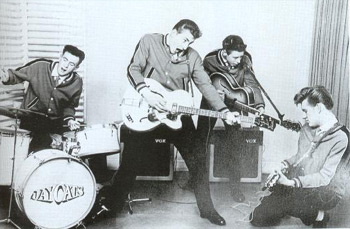
AL:
The Jaybirds was a bit later, the first band was
the Jailbreakers. I was thirteen years old and I
did a gig, the first gig that Iíd ever done, it
was a cinema in Sandiacre and we played between
the B movie and the main feature like a ten minute
spot, and that was my first introduction to show
business and the Jailbreakers did kind of R &
B stuff and a couple of other little units but
then the original, the start of the Jaybirds was
the Jay Men which then became the Jaycats which
then became the Jaybirds, so a lot of confusion
over what to call ourselves at that time and the
Jaybirds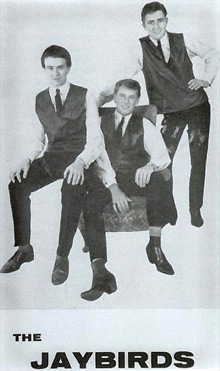 was going pretty strong for about four or five
years and we were quite big in Nottingham and that
made things difficult because we kept moving up to
London and then working in Nottingham cause we
were well known in Nottingham you know, so we
thought we got to go break in London, so we ought
to go down and get a flat and live in London and
then have to travel to Nottingham every Friday to
do the gigs because we got better money there and
we did that three times, moved to London three
times, third time stayed there.
was going pretty strong for about four or five
years and we were quite big in Nottingham and that
made things difficult because we kept moving up to
London and then working in Nottingham cause we
were well known in Nottingham you know, so we
thought we got to go break in London, so we ought
to go down and get a flat and live in London and
then have to travel to Nottingham every Friday to
do the gigs because we got better money there and
we did that three times, moved to London three
times, third time stayed there.
JP:
What sort of stuff were you playing then with
the Jaybirds?
AL:
It was rockín roll basically R & B, a bit of
blues, we did some Chuck Berry tunes that kind of
thing with the R & B leanings that was the
forerunner of Ten Years After.
JP:
So how did you effect your first big break
then you said youíd come down to London three
times and the last time you stayed?
AL:
Yeah, OK, well it all started around 1966 we
started to get good work in the clubs in London,
we got a residency at the Marquee Friday nights
now that was a big deal in those days because that
was the hot night Friday night and we were there
every week and there were places called Bluesville,
Madhouse, pubs cricketers arms but they were all
pretty good blues clubs ya know, and so we had a
circuit we were working four or five nights a week
in London on the club circuit
and started to get a name for ourselves as
a live bandÖ.and Deram records is a part of
Decca, actually itís a funny story because
weíd done an audition for Decca records and
there was a producer there, he gave us this song
to play and we went off and worked it out and came
back and played it, and then sombody came down
to the Marquee and said we want to give you
an album deal you know to record an LP which was
very unusual in those days cause you had to record
a single and if that was a hit theyíd let you
record an album, and we were I think one of the
first bands to actually start with an album which
I thought was pretty cool, so we actually went
into the studio and started to record this album
and then we got a letter from Decca who signed us
up saying we failed the audition so I donít know
it was a good clue as to how the music industry is,
the one arm didnít know what the other was doing,
we were signed on and turned down shortly after by
the same company.
AL:
We did the Ten Years After album first which is
pretty easy to do because itís your live set
youíve got your repertoire of your live set and
the numbers you know which work
and you just basically go in and play them
and thatís pretty good, I think itís by the
time you get to your third album itís a bit of a
struggle cause then you run out of the songs you
used live and you have to start thinking of new
ones thatís always the crunch. Itís
funny I remember, I donít know why it was we
used to play clubs and I remember one particular
time this is the manager of the club came up and
we played the first hour and then we
had two more sets to do and he came up and
said Iím afraid weíve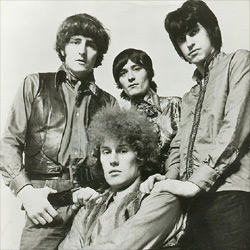 had lots of complaints, the audience canít dance
to you and we donít want you to play anymore,
and for some strange reason I had so much teenage
confidence that I thought well theyíre all wrong
and Iím right
and itís funny cause it seemed that way
ya know and later on when the blues boom happened
and suddenly that music was accepted I thought oh,
itís about time now itís going my way.
had lots of complaints, the audience canít dance
to you and we donít want you to play anymore,
and for some strange reason I had so much teenage
confidence that I thought well theyíre all wrong
and Iím right
and itís funny cause it seemed that way
ya know and later on when the blues boom happened
and suddenly that music was accepted I thought oh,
itís about time now itís going my way.
JP:
I seem to remember that you also used to
play on what was known at the time as the
underground circuit you did Middle Earth and
places like that, I mean did you, the reason I ask
I wondered whether in fact you liked the fact they
were having bills of bands who played in totally
different styles?
AL:
Yeah I loved that, yeah it thought it was great, I
used to love those things you used to get, to play
a four piece string quartet and then a rock and
roll band and then a poet and I used to think it
was great, it was all very arty and I loved the
underground, I loved being
part of it, cause it was a very exciting
period, it was the period when the whole music
thing changed now up until then the bands had to
wear suits and ties and smile while they sang and
ya, know it was all pretty much a bull-shitty kind
of thing, and the underground was the first time
ya know, you go on in your street clothes you
could play with your eyes closed, just play what
you wanted, incredibly long guitar solos it was
all accepted and to me it was freedom, freedom
from the showbiz kind of thing which I never
really wanted to be part of, but to me it was
natural you know what I mean, it was like you
didnít have to wear a larmay suit or anything
just go on with a tee-shirt and jeans and play and
that was great, it was truthful and it was free.
 JP: What about Woodstock?
JP: What about Woodstock?
AL:
I was there ya know, a lot of people come up and
say, ya know I was at Woodstock and Iíd say so
was I, yeah Woodstock was great, it was an amazing
event but then again nobody knew history was being
made at the time, I knew it was going to be a bit
different when they told us that we couldnít
drive to the gig and we had get a helicopter that
was amazingÖand it was an open sided helicopter
so I put on the old harness and I leaning, hanging
out of the helicopter over a half a million people
and there was a strong smell of marijuana coming
up and it was an amazing start to the day, and
actual memories ya know, itís all very blurred
purple haze.
JP:
I was thinking also in terms not just of
the gig itself but the film which must have taken
your music to an enormous number of people.
AL:
Yeah, it was the film that in fact made the
difference. We did the festival and then we were
playing like two to three thousand seater Kenettic
Playground type of gigs, Fillmore type of gigs
those things, we did Woodstock, it was an amazing
event, I personally had a good time there but
thought nothing of it and then we carried on for a
year playing two and three thousand seaters then
the movie came out and thatís when it all got
silly and soon we were playing ice hocky arenas
and that kind of thing which actually I didnít
find all that good, I didnít like playing those
places, we were playing to security guards with
cotton wool in their ear and a big orchestra pit
with barriers and ya know it seemed to me that no
one was listening. I perfer the underground phase
ya know, like the Fillmore type gigs they were
more clubby and I prefer a clubby vibe you can,
sweat dripping down the walls and the sound
pounding on the walls and thatís some of the
best gigs that Iíve ever done. 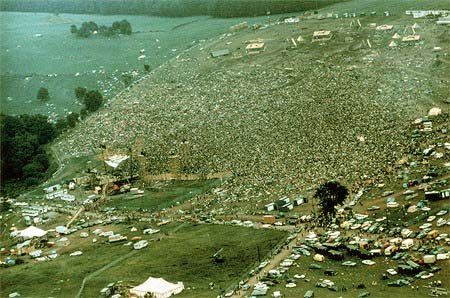
JP:
Alvin you said that the whole move to stadium
rock was one of the reasons that you decided
ultimately to break the band up.
AL:
Yeah it was the whole band got disenchanted,
it was that feeling of what are we doing here, no
one is listening, ya know a lot of people say
Woodstock made Ten Years After but in fact it was
the beginning of the end when the movie came out
there was a lot of disenchantment, I didnít like
being a rock and roll star in inverted corners, I
thought of myself as a musician. I was very naive
in those days ya know, I thought Iíve already
made much more money than I should do anyway and
that wasnít kind of part of the plan and I tried
to hold it all back in fact I did what I called
deescalated the whole thing and stopped doing all
the interviews and all that and didnít really
want to play that game at all which seemed to even
make it
worse, then they thought I was Greta Garbo.
No, itís funny the success that everybody
thought it really must be great when you made it
but that wasnít that good at all, I prefer the
earlier parts.
JP:
But you still kept on going to the states I
believe you did something like twenty eight tours
in five years or something which is a phenomenal
amount of work to get through.
 AL:
Yeah well the band was over toured, I remember
complaining about that because we would do like a
thirteen week tour of America, come back to
London, have two days off and then start on a ten
week tour of Europe, and then some bright spot
would call me up on the telephone and say your in
the studio next week we hope youíve got the
songs ready, and I was writing songs in the taxi
on the way to the session and things like that and
I was just getting too much pressure and I needed
time off, and there was an album called A Space in
Time which was a dedication to that time off that
I managed to dig my heals into the ground and say
thatís it, Iím not working, I want to write
songs, I want to be a musician, but they kept
saying but Alvin you can make millions of dollars,
there was a demand for the music but I didnít
feel that I was living up to it. I didnít feel I
was getting enough creative time to supply good
music, cause you had to rush it all and I was over
toured. Itís funny because when you start a band
off you just want to fill your date sheet up
thatís your ambition to work six nights a week,
when that happens you go four five or six years
maybe just doing that and being glad of it but
suddenly or sooner or later you think where are we
going from here, I used to say weíre turning
into a travelling juke-box, it sometimes used to
feel that way ya know, youíd arrive at a gig,
then plug in and play and take it out and off to
the next town same thing, and you do that like
fifty or sixty times in a row and you start to
loose the spontaneity. AL:
Yeah well the band was over toured, I remember
complaining about that because we would do like a
thirteen week tour of America, come back to
London, have two days off and then start on a ten
week tour of Europe, and then some bright spot
would call me up on the telephone and say your in
the studio next week we hope youíve got the
songs ready, and I was writing songs in the taxi
on the way to the session and things like that and
I was just getting too much pressure and I needed
time off, and there was an album called A Space in
Time which was a dedication to that time off that
I managed to dig my heals into the ground and say
thatís it, Iím not working, I want to write
songs, I want to be a musician, but they kept
saying but Alvin you can make millions of dollars,
there was a demand for the music but I didnít
feel that I was living up to it. I didnít feel I
was getting enough creative time to supply good
music, cause you had to rush it all and I was over
toured. Itís funny because when you start a band
off you just want to fill your date sheet up
thatís your ambition to work six nights a week,
when that happens you go four five or six years
maybe just doing that and being glad of it but
suddenly or sooner or later you think where are we
going from here, I used to say weíre turning
into a travelling juke-box, it sometimes used to
feel that way ya know, youíd arrive at a gig,
then plug in and play and take it out and off to
the next town same thing, and you do that like
fifty or sixty times in a row and you start to
loose the spontaneity.
JP:
So was your first solo album which I think was the
one with Mylon Le FŤvre a deliberate attempt to
get away from the old band sound?
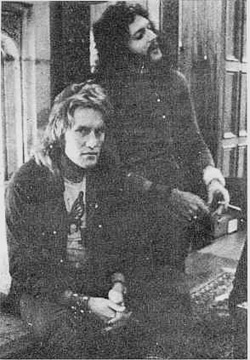
AL:
Yeah,Yeah it was it more of a country kind
of feel more of a melodic kind of thing, more
tunes and less and it wasnít rock and roll, I
mean I was getting away from that rock and roll
kind of tag of course, I was probably a bit too
aware at the time of criticism and press people
who use to call me Captian Speed Fingers and All
Haste and No Taste and things like that, yeah I
was turning against the whole rock and roll thing
for awhile, in fact there was a period where I
didnít play any rock and roll just to get away
from that image---it was a personal problem, I had
it all wrong to be honest, ya know I say I was
very naive, but I was trying to keep my
credibility and that has always been the important
thing to me, I think if you loose that then your
in trouble and if I started to feel that I was a
rip off and I wasnít being truthful to myself
then I couldnít really play thinking that you
have to have your own credibility to continue
itís very important.
In fact there was a band, I did an album
called In Flight and it was called Alvin Lee and
Company. It was an eight piece band, a percussion
player, two girl singers, Mel Collins on sax, and
it was quite a funky little outfit actually and I
enjoyed playing that and I got totally away from
rock and roll and I didnít do all the classic
songs, I didnít do any Ten Years After songs and
that was the rebel again ya see, itís a funny
thing how you turn against what makes you famous,
I know Jimi Hendrix he hated to play Hey Joe which
I thought is a great number I still play Hey Joe
he hated it because it was so popular and I for
awhile I felt like that about Iím Going Home,
itís like itís the only thing we played
everyone would shout Iím Going Home all the way
through the set it gets kind of annoying, so I did
this whole set played for about a year never
played any of those tunes but one day I went to
see Jerry Lee Lewis, he was playing in Birmmingham
England. Iíve always been a big fan of Jerry Lee
and he was playing Country and Western, he was
going through a funny phase and he didnít
play Whole Lotta Shakeín and Great Balls
of Fire and I came out of that gig greatly
disappointed and realized that if people came to
see me and I didnít play Iím Going Home or
Love Like A Man theyíd feel the exact way that I
felt and I didnít want my audience to feeling
like that when they left the gig, so the very next
day I went back to the band and said Iím doing
Iím Going Home tonight and played it and it felt
great, it was like finding an old friend after a
few years ya know.
JP:
Alvin now youíve got a great new album out,
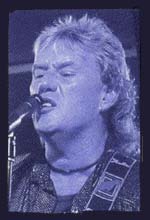
AL:
Thank You Very Much,
JP:
and to me despite the fact that it still has the
blues feeling you know, the rock and roll feeling,
it sounds pretty modern to me particulary on a
track like ďReal Life BluesĒ tell me something
about the track and how it came about.
AL:
Real Life Blues ok, well itís a real life
feeling I was working in the studio until about
two in the morning and I decided I needed a little
break just to lighten my head a bit so I went in
the house and switched on the TV and just caught
the war breaking out in Yugoslavia, a highjacking
and several murders and I thought and it really
effected, I was trying to be creative and it I
thought so much trouble in the world itís time
we had some better news maybe a song in there so I
wrote the song basically on that feeling came back
into the studio. It was a bring down to me and I
was angry and the song is kind of a mellow chord,
I didnít play any lead at first I had the song,
and then I did a lead guitar it was really angry,
I was angry at the world ya know and so much
trouble in the world, I was doing all this really
manic guitar.
I
then called up George Harrison, heís always been
a mate of mine and heís played on a lot of my
albums and Iíve played on his and I said any chance that you come play a bit of slide on this tune, it
needs a bit of slide and he said Iíll be right
over and he came over and he played.
I
took my guitar out of the mix ok so he just had
the basic chord feel of it and he played this
beauitful sympathetic slide guitar that was so
wonderful and it turned the whole song around for
me cause instead of so much trouble in the world
it was like so much trouble in the world and he
did the guitar fills and the first solo and I was
going to play the second solo so I checked out
what I was playing by the end of the track it was
crazyness ya know, it didnít fit at all so I had
to rethink the whole end of the solo and make it
more kind of mellow and sympathetic and thatís
what he did to it, he took the angry bit out of it
and he turned it around and made it much more
interesting for me, itís nice when that happens.
JP:
Thereís a real variety of songs on the album
everything from R & B Rock and Roll and a
certain amount of
blues, something like Jenny Jenny which is
superficially sounds like a Chuck Berry riff
but thereís all kinds of 1950ís things
going on in there as well.
AL:
Yeah thatís right, I was very happy with that,
that was one of the songs it took me about ten
minutes to write that one, in fact I was working
with my song writing collegue Steve Gould and
weíd been working all day on this song and
getting nowhere and I said to hell with this,
letís play some rock and roll and we wrote Jenny
Jenny in ten minutes and I was very happy with it
because to me it sounds like it was a song
that should have been written in 1958 and
escaped thatís basically it
and to me I thought it was Jerry Lee Lewis
cause the guitar is Chuck Berry (the guitar fills
are Chuck Berry) but the rhythm is Jerry Lee
Lewis.
JP:
To some listeners who maybe havenít heard your
music in some time there is a superficial
difference between Iím Going Home and the stuff
on the new album, but do you really see it as that
different?
AL:
I donít, I see Jenny Jenny and Going Home to me
are very very similar, itís just cooking rock and roll twelve bars they
have different flavors but to me itís all the
same roots thatís rock and roll itís Jerry Lee
Lewis, Little Richard, Chuck Berry and what you
can do with that whole feeling.
JP:
How do you thinkóI mean people still regard you
as a guitar player as well as everything else and
very much a solo guitar player, I mean do you
think your solo playing has changed much over the
years?
AL:
Some ya some, Iíd like to think its got better
Iíve got more control I think now,
Iím probably appreciating spaces more I
think sometimes if youóa gap between the notes
is sometimes more important then putting notes in,
ya know itís like light and shade and everything
else.
JP:
In thirty, forty, fifty, sixty or whatever how
many years time it is and that great bluesman in
the sky calls you to play that last lick how would
you like to be remembered?
AL: Iíd like to be remembered as a musician
rather thanóIíve always tried to be a musician
rather than a pop star, I hate anything to do with
pop music and I donít really like show business
as Iíve said my heros are people like John Lee
Hooker and Muddy Waters and John Lee Hooker is
over eighty now and still playing and I think
thatís great, if I ever make it to eighty I hope
Iím still playing too, in fact Iím sure I will
be because I donít want to stop now, and itís
too late for me to get a proper job.
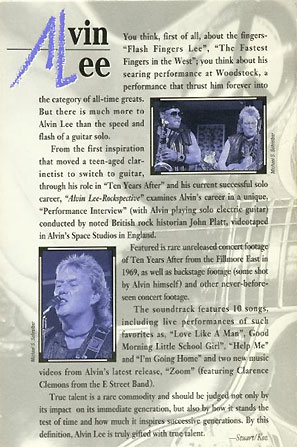 |
Alvin
talks about his new release called
ZOOM:
Q:
Alvin how did you come up with Zoom
for the album title?
AL:
Well Zoom seemed to get the best reaction
from people.
Q:
Can you tell us about the songs on
this record?
AL:
The songs have been written over the past
two years or so, I write songs all the time,
itís my hobby and my trade as well. Itís
a pretty good collection of songs and Iím
really happy with ďReal Life BluesĒ
ďJenny JennyĒ and ďRemember MeĒ (when
Iím dead and gone) which is actually about
my own epitaph. Iím looking forward to
people hearing ďJenny JennyĒ itís like
a fifties rock and roll song that sounds
like it sould have been written over twenty
years ago, and Clarence Clemons (from Bruce
Springsteenís E Street Band) is on it too.
I was thinking yesterday that my
favorite song was ďUse That PowerĒ which
to me has a double meaning. Itís all about
ecology, protecting the environment and
about being pissed off about dumping all
that shit into our environment, so Use That
Power is a warning cry to stop it now.
It also means Use That Power as in use your
power and change things back to the way it
ought to be, and use all your power.
|
|
Q:
Alvin, are all the compositions on Zoom your
originals?
AL:
Yes, although I co-wrote some of them with a
man named Robbie Sideman who is an American
living in LA, he came over to England and we
wrote ďAnything For YouĒ as a middle of
the road song on this collection, but itís
still in the good old rock and roll style.
Itís a good jamming blues song and Jon
Lord (from Deep Purple) plays the Hammond
organ and Clarence is on sax.
Q:
Describe if you would the style of
music that you consider Zoom to be under.
AL:
Itís a blues-based-rock and roll thing I
suppose, if you needed to pigeon hole the
thing, itís basically blues, with the
roots of rock and roll with some progressive
leanings. Iíve always thought of myself as
a progressive musician, I did my gig when I
was around thirteen or so in Hamburg,Germany
and it was the first time I was ever out of
England.
Q:
Who have been your most important
influences in music?
AL:
Well to begin with I was brought up
listening to all kinds of blues, as my
father had a huge collection of blues
records and I moved towards the most ethnic
kind of blues, people such as Muddy Waters,
John Lee Hooker and Lonnie Johnson were the
original artists that I picked up on.
As
I was growing up, Big Bill came to visit my
house, my parents went to one of his shows
in Nottingham and brought him home with
them. I think I was twelve at the time and
the whole thing had a big impact on me. Bill
sat in our living room and played his guitar,
after that I discovered Chuck Berry, rock
and roll, Jerry Lee Lewis and all the rest
of them. I still listen to Jazz guitar, Wes
Montgomery, Barney Kessel and George
Benson, itís thanks to my parents that I
was exposed to quite a lot of different
music and I feel the thirties swing stuff
had a big influence on the history of rock
and roll as we know it today.
Q:
When did you decide to take these
influences and venture out on your own?
AL:
I think in 1962, was the start, as
there was a blues boom headed by John Mayall
and suddenly the blues became the ďIN
thingĒ.
I always loved to play the blues
before it became popular but before it was
accepted. We used to get tossed out of clubs
because people complained that they
couldnít dance to our music, so I went
back to basic rock and roll.
When the blues boom came I already knew all
of the great songs because Iíd been
exposed to them all my life, so suddenly I
found myself back in the blues.
It all goes in cycles, I went through years
where Iím very blues based, then I move to
rock and roll then into a psychedelic period
and then onto progressive, and then back
into the blues, and around it goes.
My first time in America back in 1967 I was
amazed to discover that most Americans
didnít know who Big Bill Broonzy or Lonnie
Johnson were. After all this is your music
your heritage all we did was copy it, so in
fact I was playing American music with some
English energy added to it and then
recycling it and sending it back to America,
Iíve always been a fan of American music.
Q:
Alvin, how did you get George
Harrison, Jon Lord and Clarence Clemons to
help you on Zoom?
AL:
Well, Iíve known George since 1973
when Mylon LeFevre and I were working on the
On the Road to Freedom recording which for
me was a positive step away from rock and
roll.
George wrote a song on that album called
ďSo Sad (no love of his own) and ever
since that time he likes to come over with a
guitar in hand and a bottleneck, he plays a
very good slide guitar by the way.
Jon Lord Iíve known since the 1960ís,
heís played on some of my albums and
Iíve played on his. George, Jon and I all
live very close to each other in the part of
England called The Thames Valley.
Clarence I met on the Peter Maffay tour
recently in Germany and Clarence and I get
along just great, we shared a dressing room,
sat around and just jammed, Clarence said
Iíll be on your album if youíll do the
same for me. Clarence is great I love him
and heís certainly a ďlarger than life
human beingĒ.
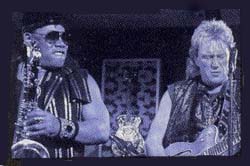
Q:
Alvin,who else do you have in your
band right now?
AL:
Alan Young is with us as drummer and
has been for the last three years and as his
name implies heís the young-blood in the
band.
Our bass player on live gigs is Steve Gould
and he and I wrote Jenny Jenny together. On
this album though I used Steve Grant. We all
have a good relationship and weíre going
to keep working on it.
Q:
Alvin, what do you think of the new
generation of blues guitar artist coming
along now, like Gary Moore for instance?
AL:
Yeah well, I think itís great and I
know Gary pretty well, he was very surprised
that his album did so well, because the
record company made it very clear that they
didnít want blues they wanted heavy metal.
Gary had gotten away from his heavy metal
image and now all the record labels want the
blues.
Gary plays city blues and not the country
blues, which is in the more acoustic style,
like the Mississippi Delta Blues. There are
so many forms and variations of the blues
that hopefully this craze will embrace all
of them.
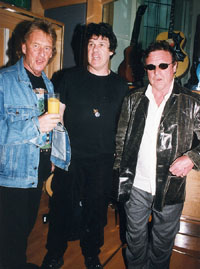
Q:
Do you think Gary may be using some
of the work that you yourself pioneered as a
member of Ten Years After?
AL:
Yes, well I might have pioneered
something with Ten Years After, just as BB
King did it before me. Itís just
influences and Gary told me that I was his
biggest influence after seeing a Ten Years
After gig. He never forgot it because he
fell off his motorbike on his way home from
the concert.
Itís good to be an influence like that,
Iíve met a lot of guitarists on the road
who want to play my guitar, they show me
their version of the intro to ďIím Going
HomeĒ and they play it exactly the same
way that I did, note for note, even I
donít do that, I change it a little bit,
so I say to them thatís very good now go
off and learn your own licks.
Bruce
Alvin Lee, Gary Moore, Jack Bruce
Q:
Would I be close in saying that Zoom
highlights each part of your music career?
AL:
All the styles that I play, blues, rock and
roll progressive or even psychedelic are all
in evidence on this record, it sounds like
me but it also pays tribute to the roots too.
Q:
Then are you happy with the overall
results on Zoom?
AL:
Yes Iím happy as a sandman, I just
heard it last night for the first time and
it sounded great, itís the first time
because for the last three months Iíve
been working on it everyday and I think
itís my favorite album so far.
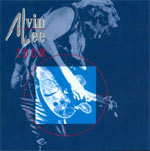
Jimmy Page said of Alvin Lee, ďheís just greatĒ
said the most unimpressionable Jimmy, as his
eyes were spellbound from watching Leeís
fingers!
When
someone asked Alvin about being the fastest
guitarist in the world his firm reply was:
"I don't think so, no way. There are
plenty of guitarists faster than me.
Django
Reinhardt was faster than me and he only had
two working fingers. It's a silly title
anyway. I never was, I never will be and
who's counting anyway?"Alvin Lee in
1984
|

Guests
at Joe Brown's & Manon's wedding August
2000
Bert Weedon, Chas, Roger Glover, Alvin Lee, George
Harrison and Leslie Glover
Hi Dave &
Brigitte ! Thanks for your email.
Really enjoyed the websites. I've long
been a fan of Ten Years After. Until
fairly recently before he moved abroad, I used
to meet Alvin in the company of Joe Brown, they
lived near each other and are great friends, as
you probably know. Have you checked out my
website www.chasmcdevitt.com
there ia a photo in the first page of pictures,
taken at Joe's wedding, that includes Alvin and
George Harrison; Joe's Best Man at the wedding.
All the best, Chas McDevitt.
|